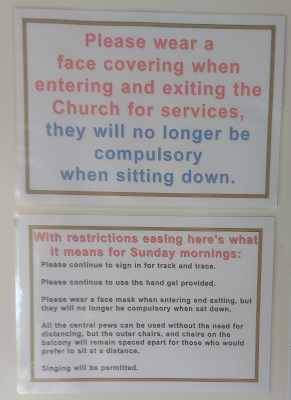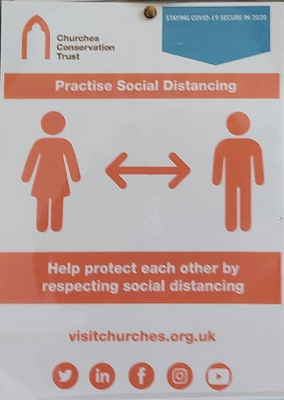Sorry I've not been blogging lately. It's all been tricky. We intercepted a communication that fell through a wormhole in time and space from the 29th century, and it's taken all the Moot House computing power for a month to translate it. Still, here's what we have. I have no idea what it means.
Much effort has been put into understanding the nature of 21st Century religion. We knew that at special times of the year - notably early December - people would make pilgrimages to religious locations called "Shoppincentres." But after roughly 2020, these gatherings fell out of use.
Their place seems to have been taken by smaller, older buildings that were - as far as we can decipher what is known of their language - known as "churches". These churches had presumably been the home of an older religion, which returned as the Shoppincentre cult lost influence. However, their artefacts radically changed at the time of the Shoppincentre decline.
This sign was put up outside a Lincolnshire church in 2020, and remained in situ for 400 years. We believe "IN ABEYANCE" may have something to do with the heating system.
Churches contained many types of written memorial. Some were carved into stone. While others, perhaps those that were meant to last longer, were written on paper and then encased in plastic. Here is an example of a plastic-preserved memorial - what we call a "laminate". The laminate below, for instance, we believe may have been prayers to a god of doorways.
Readers will be aware that the people of the 21st to 24th centuries transferred all their written records to electronic data storage. As a result of the Great Polar Reversal, these were all lost, and with them our ability to understand the language they spoke. We know that previously they had often put their trust in a deity, "Googletranslate", whose worshippers could understand all languages: but not very well.
Sometimes the pictures on the laminates are enough. We cannot decipher the words here, but it is clear that the worshippers practised strict sexual segregation.
The most common ritual objects in churches, over a 400 year period, were small votive containers. Chemical analysis has revealed that they contained alcohol, and they were often equipped with the ability to spray that alcohol. Our conclusion therefore is that they were used for pouring libations on to the altar, or on to the thresholds of the church - as they were found most often around those two areas.
 |
We belive "99.9" refers to the purity required of worshippers to approach the altar.
|
 |
A libation sprayer that was apparently intended to be fixed to a wall. Possibly at the holiest point in the church?
|
Again, we have no definitive knowledge of their language, but folk memory seems to recall a god called "Hans Anitiser". Possibly a German god, whose worship spread alongside the use of the libation sprayers. Were the laminated prayers to Hans Anitister? If so, we can conclude that the god was best addressed in multiple colours and Comic Sans font.
Finally - what are we to make of the Ritual Tape?
There are rolls of Ritual Tape in churches all over the former United Kingdom. What were they for? And why are they always hidden in cupboards?
We can assume the Ritual Tape was used to mark off sacred from less sacred areas. But why did it fall out of use? And, when it did - why is it so often to be found with more "laminates", these only showing red crosses or green tick shapes?
There is still much mystery about the beliefs of the Hans Anitiser people. Perhaps we will never know it all.






